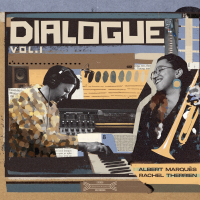Home » Jazz Articles » Album Review » Christian Parker: Change Is Now - A Tribute To The Byrds
Christian Parker: Change Is Now - A Tribute To The Byrds
Fifteen tracks that span the nine years of the iconic American band's history represent a discerning cross-section of their eclectic work and remind of the enthralling grace and elegance in their sound. Yet, in stark contrast to the often Zen-like tranquility of the source recordings, there's an insistent edge to these takes that distinguishes them even further from the originals.
Christian Parker and company sound wholeheartedly engaged in what they are playing and singing. Tellingly, the title track is the opening cut, an excerpt from what is perhaps the greatest (and most tumult-ridden) of all Byrds long-players The Notorious Byrd Brothers (Columbia Records, 1968). It features the tart sound of Gary Jacob's pedal steel mixed with layers of electric guitars, including the innovative B-Bender instrument invented by guitarist Clarence White and multi-instrumentalist Gene Parsons (latter-day Byrds after membership in the rock/c&w marriage that was the Nashville West ensemble).
Melding contemporary folk music with Beatles-style rock and roll at the outset of their career, the Byrds' very first brush with commercial success arrived in the form of their cover of Bob Dylan's "Mr. Tambourine Man." It is then only appropriate to include more work of the Nobel Laureate's here, but in keeping with this album's overriding avoidance of the obvious, it is The Bard's "Chimes of Freedom" that appears in all its ringing twelve-string Rickenbacker guitar glory.
It's crucial to note the juxtaposition of four songs within this track sequence written by the late Gene Clark. Parker wisely places special emphasis on the often-overlooked contributions of the man who should've/could've been the chief songwriter of the Byrds; the now-deceased co-founder composed the ethereal likes of "She Don't Car About Time" and "The World Turns All Around Her" well as the dreamlike "Here Without You." In retrospect, all those tracks foreshadow the mature work of the roots-oriented latter-day Byrds lineups.
And then there's "Feel A Whole Lot Better." One of the standouts of the group's 1965 debut album, it deservedly features more prominent vocal harmonies than the other three tunes but reaffirms the wisdom of its choice as well as that of its counterparts by the author Clark, who was co-founder of the group but left abruptly in 1966. Appropriately, the fifth song of his here is "Full Circle" from the clumsily executed Byrds reunion album of 1973. Appearing at the homestretch of this forty-two plus minutes, it's an introduction for the fitting and gently emphatic punctuation to this declaration of support for a timeless sound that takes an acoustic turn on this finale "The Last Thing on My Mind."
Likewise, sans any iota of the saccharine, "Wild Mountain Thyme" and "Get To You" echo with the strings of 'One Man Orchestra' Stevie Blacke and avoid any hint of merely copying the Byrds' arrangements. Meanwhile, "Your Gentle Ways of Loving Me" is a gentle but steady bluegrass gallop, wherein Nick Piccininni's mandolin is contoured to the stately piano from Earl Poole Ball, who not only played on the original Sweetheart (and its modern counterpart), but Safe At Home (LHI Records, 1968), the country-rock endeavor of the late Gram Parsons that predated his abbreviated membership in the Byrds.
Like the rest of the album, these tracks evince a deeply emotional connection to this music on the part of Parker and company. Change Is Now is a full-hearted (and full-throated) embrace of singular artistry that redefines the concept known as 'labor of love,' right down to Christian Parker's shared production and engineering with percussionist Ron Keck; their technical collaboration provided sonics of ringing depth for preservation by Larry Lachmann at Kevorkian Mastering.
Audio as colorful and evocative as Masiha Fattahi's cover artwork (a mirror of imagery on the previous record) reflects how fresh Change Is Now sounds, almost six decades after the first appearance of its earliest selections. Christian Parker and his merry band—perhaps in tandem with surviving Byrds Roger McGuinn and Chris HIllman—would be doing further service to themselves and this music if they toured to play concerts and thus further spread the word of how authentic a homage is A Tribute to The Byrds.
Track Listing
Change Is Now; She Don't Care About Time; Here Without You; The World Turns All Around; Her I'll Feel a Whole Lot Better; Chimes of Freedom; Wild Mountain Thyme Ballad of Easy Rider; Get to You; Time Between; Your Gentle Way of Loving Me; Full Circle; Bugler; Farther Along; The Last Thing on My Mind.
Personnel
Christian Parker
guitar and vocalsGary Jacob
guitar, 12-stringEarl Poole Ball
pianoChris Larcombe
guitarJennifer Kessler
violinAndy Rudy
pianoJoe Thomas
vocalsPaul Davie
bass, electricRandy Tennant
bassRon Keck
percussionAdditional Instrumentation
Christian Parker: acoustic, B-Bender, 6 & 12-string guitars, vocals; Gary Jacob: pedal steel guitar; Stevie Blacke: strings “One Man Orchestra”; backing vocals; Joe Thomas: keyboards; Nick Piccininni: mandolin; Michael Rinne: bass, upright bass; Paul Davie; bass guitar.
Album information
Title: Change Is Now - A Tribute To The Byrds | Year Released: 2024 | Record Label: Subcat Records
Tags
About Christian Parker
Instrument: Guitar and vocals
PREVIOUS / NEXT
Support All About Jazz
 All About Jazz has been a pillar of jazz since 1995, championing it as an art form and, more importantly, supporting the musicians who make it. Our enduring commitment has made "AAJ" one of the most culturally important websites of its kind, read by hundreds of thousands of fans, musicians and industry figures every month.
All About Jazz has been a pillar of jazz since 1995, championing it as an art form and, more importantly, supporting the musicians who make it. Our enduring commitment has made "AAJ" one of the most culturally important websites of its kind, read by hundreds of thousands of fans, musicians and industry figures every month.






















